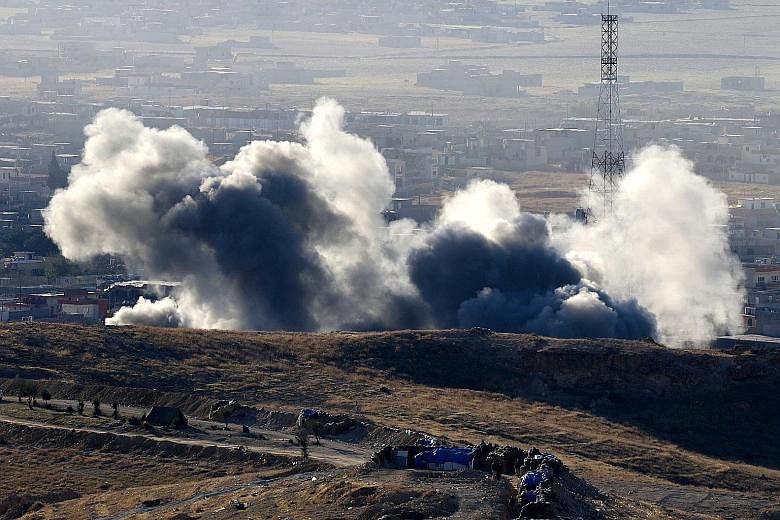British government ministers have never claimed that air strikes are a panacea against threats emanating from Syria. But they have argued that, in the absence of a broader foreign military involvement to stop the Syrian civil war, air power can still achieve useful objectives.
The first objective is to target the bases of the so-called Islamic State in Iraq and Syria (ISIS) terrorist organisation. It is pointless to fight ISIS in Iraq - as a Western-led coalition of nations which includes Britain has done for the past two years - only to see the terrorists seek refuge and supplies across the border in neighbouring Syria. ISIS militants "don't recognise a border between Iraq and Syria, and neither should we", says British Prime Minister David Cameron.
Destroying ISIS also requires the elimination of the organisation's lifelines, such as its supply and recruitment routes and the oil smuggling businesses which provide ISIS with cash, all of which flow through Syria.
French President Francois Hollande has instructed his air force to do so and, according to British officials, the results are encouraging.
Air power, military commanders in London acknowledge, cannot stop the Syrian government from waging war on its people. But it can limit the intensity of the bloodshed. It was only the threat of the use of air power that persuaded Syrian President Bashar al-Assad to give up most of his chemical weapons in a deal brokered in 2013. It was also the selective use of air strikes which limited the Syrian military's ability to inflict an even higher rate of casualties on its civilian population.
And London is anxious to point out that the use of strikes from the air - usually delivered by "drones", or unmanned aerial vehicles - is already playing an important role in eliminating some of the notorious terrorists, such as Mohammed Emwazi, otherwise known as "Jihadi John", the Briton filmed beheading hostages in various ISIS propaganda videos.
British diplomats admit that the legal case for air strikes in Syria is not watertight. Still, they point to a number of arguments which indirectly justify it. Last week, the United Nations Security Council unanimously adopted a resolution branding ISIS "a global and unprecedented threat to international peace and security". While that resolution does not explicitly authorise the use of force, it clearly calls on all UN member states to "take all necessary measures" under international law and the UN Charter.
One clear principle of international law is the right of collective self-defence, and it is this tenet that countries can use in deploying their air power: The recent terrorist attacks in France were hatched and organised by ISIS, and it is obvious that further attacks are being planned. "I firmly support the action that President Hollande has taken to strike," said Mr Cameron. "It is my firm conviction that Britain should do so too," he added at a joint news conference after his meeting with Mr Hollande earlier this week.
Finally, the civil war in Syria has already killed a quarter of a million civilians, and displaced a further eight million, some of whom are the refugees now streaming into Europe. Doing nothing about the conflict in Syria is, therefore, no longer an option, argue British officials, for the consequences of the Syrian civil war are already felt in Europe.


